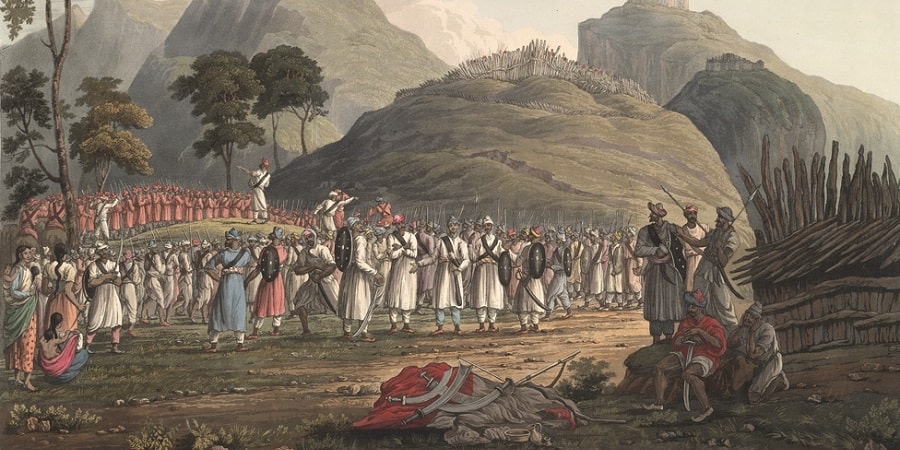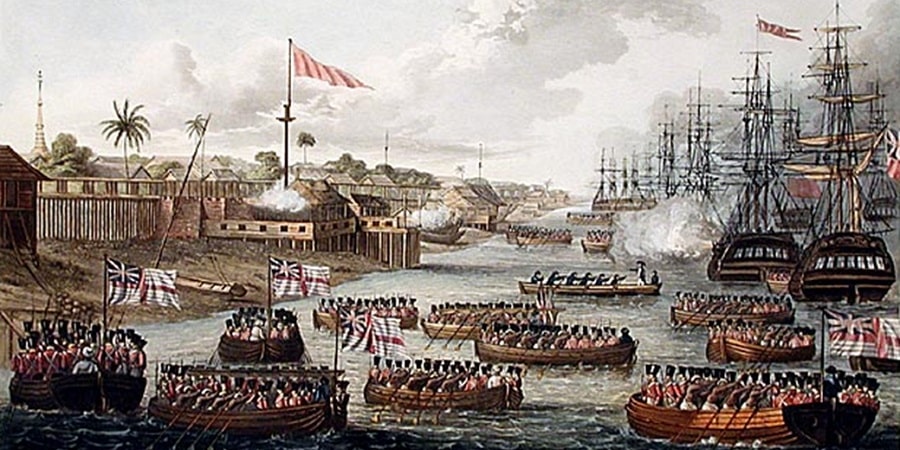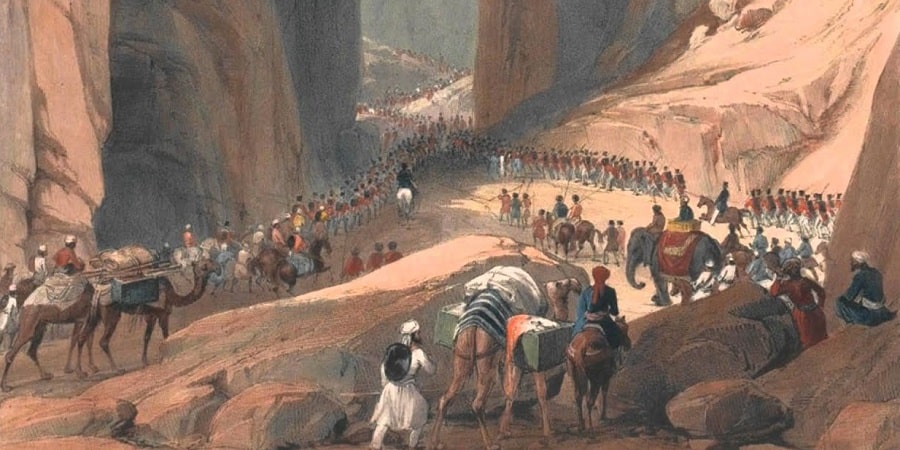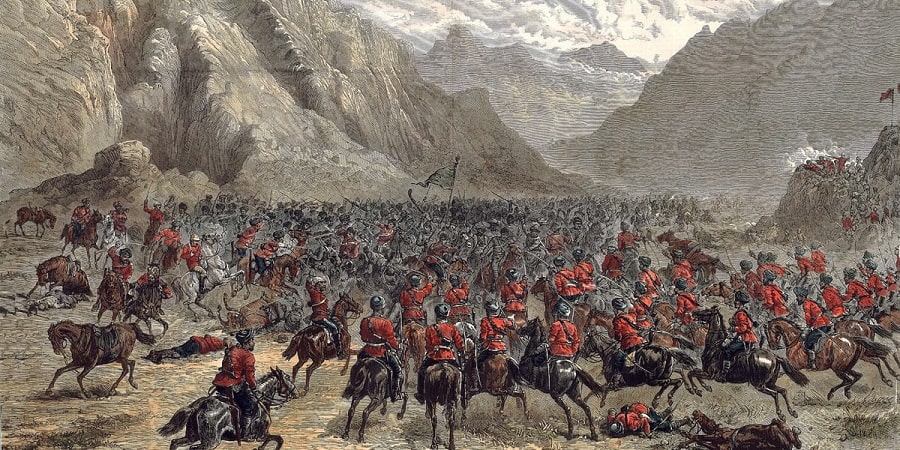March 13, 2019
Relation of British India with Neighboring Countries
Contents
>>>>>>
Anglo-Bhutanese Relations
- 1865, the Bhutanese were forced to surrender the passes in return for an annual subsidy.
- It was the surrendered district which became a productive area with tea gardens.
>>>>>>

>>>>>>>
Anglo-Nepalese Relations
- 1801, English annexed Gorakhpur which brought the Gorkhas’ boundary and the Company’s boundary together
- Conflict started due to the Gorkhas’ capture of Butwal and Sheoraj in the period of Lord Hastings (1813-23)
- War, ended in the Treaty of Sagauli, 1816 which was in favour of the British
- Nepal accepted a British resident
- Nepal ceded the districts of Garhwal and Kumaon.
- They abandoned claims of Terai.
- Nepal also withdrew from Sikkim.
- British acquired sites for hill stations, such as Shimla, Mussoorie and Nainital.
- Gorkhas joined the British Indian Army in large numbers.
Anglo-Burmese Relations
- British want to capture forest resources of Burma, market for British manufactures in Burma
1st Burma War (1824-26)
- Burmese expansion westwards and occupied Arakan and Manipur, and became threat to Assam and the Brahmaputra Valley.
- British expeditionary forces occupied Rangoon in 1824 and reached within 72 km of the capital at Ava
- Peace was established in Treaty of Yandabo, 1826
- British cede its coastal provinces of Arakan and Tenasserim
- Burma abandon claims on Assam, Cachar and Jaintia
- Recognise Manipur as an independent state
- Accept a British resident at Ava and posting a Burmese envoy at Calcutta.
>>>>>>

>>>>>>
2nd Burma War (1852)
- 2nd war was result of imperialist policy of Lord Dalhousie.
- British merchants were keen to get hold of timber resources of upper Burma and also sought further inroads into Burmese market
- British occupied Pegu, the only remaining coastal province of Burma
3rd Burma War (1885)
- After death of Burmese King Bhindan, his son Thibaw succeeded to throne.
- Thibaw was hostile towards the British
- A humiliating fine had been imposed on a British timber company by him.
- Dufferin ordered the invasion and final annexation of upper Burma in 1885
- British faced a strong guerrilla uprising in whole of Burma soon after
- Burmese nationalists joined hands with the INC
- To weaken this link, Burma was separated from India in 1935
- Burmese nationalist movement further led by U Aung San during 2nd World War
- Burma got independence on January 4, 1948
Anglo-Tibetan Relations
- Tibet was ruled by a theocracy of Buddhist monks (lamas) under nominal suzerainty of China.
- Russian influence at Lhasa was increasing
- Curzon felt alarmed and sent a small Gorkha contingent under Colonel Younghusband in 1903
- Tibetans refused to negotiate and offered non-violent resistance
- Younghusband pushed his way into Lhasa (Aug 1904) while Dalai Lama fled
- Treaty of Lhasa 1904 singed
- Tibet would pay an indemnity of Rs 75 lakh at the rate of 1 lakh rupees per annum
- As a security for payment, Indian Government would occupy the Chumbi Valley (territory between Bhutan and Sikkim) for 75 years
- Tibet would give Great Britain some control over foreign affairs of Tibet
- Treaty was revised reducing the indemnity from Rs 75 lakh to Rs 25 lakh and providing for evacuation of Chumbi valley after 3 years
- Only China gained in the end out of the whole affair
- According to Anglo-Russian convention of 1907, two great powers would not negotiate with Tibet, except mediation of the Chinese government.
>>>>>>

>>>>>>
Anglo-Afghan War
- After the Treaty of Turkomanchai (1828), between Persia and the Russian Empire, English got alarmed about possible Russian plans regarding India.
- Passes of the north-west seemed to hold the key to enter India
- Need was felt for Afghanistan to be under control of a ruler friendly to the British
- Auckland advocated a forward policy in 1836
- Company government in India itself had to take initiatives to protect boundary of British India
- Tripartite Treaty (1838) was entered into by British, Sikhs and Shah Shuja (deposed from the Afghan throne in 1809)
- Shah Shuja be enthroned with the armed help of the Sikhs
- Shah Shuja conduct foreign affairs with advice of the Sikhs and the British
- He recognises the Sikh ruler, Maharaja Ranjit Singh’s claims over the Afghan territories on the right bank of the River Indus.
1st Anglo-Afghan War (1839-42)
- British intention was to establish a permanent barrier against schemes of aggression from the north-west
- An English army entered into Kabul in 1839 after a successful attack
- Most of the tribes had already been won over by bribes.
- Dost Mohammed surrendered in 1840 and Shah Shuja was made Amir of Afghanistan.
- But Shah Shuja was unacceptable to the Afghans.
- Afghans rose in rebellion, killing garrison commander in Kabul
- British were compelled to sign a treaty in 1841 with Afghan chiefs
- British East India Company troops are destroyed by Afghan forces on the road from Kabul to Jalalabad, Afghanistan
- Afghan force was leaded by Akbar Khan, son of Dost Mohammad Khan.
- British agreed to evacuate Afghanistan and restore Dost Mohammed
- British re-occupied Kabul in Sept 1842 and arrived at a settlement with Dost Mohammed.
- 1st Afghan War cost India 1.5 cr. rupees and nearly 20,000 men
- The ‘Masterly Inactivity Policy‘ was followed by the British towards Afghanistan from 1860-76.
- It was conceived by John Lawrence.
- It fulfils two conditions
- Peace at the frontier was not disturbed
- no candidate in civil war sought foreign help
- Sher Ali established himself on throne, Lawrence tried to cultivate friendship with him
2nd Anglo-Afghan War (1878-80)
- British conservative government under Benjamin Disraeli (1874-80), Lytton became the Viceroy of India in 1876
- He started a new foreign policy of ‘proud reserve’.
- Lytton made an offer of a favourable treaty to Sher Ali, but Amir wanted friendship with both Russia and British India.
- Sher Ali refused to keep a British envoy in Kabul.
- Lytton decided to invade Afghanistan.
- Sher Ali fled in face of the British invasion, and the
- Treaty of Gandamak 1879 was signed with Yakub Khan, the eldest son of Sher Ali.
- Amir conduct his foreign policy with the advice of Government of India.
- Permanent British resident be stationed at Kabul.
- Government of India give Amir all support against foreign aggression, and an annual subsidy.
- Soon, Yakub replaced and Abdur Rehman became the new Amir.
- Ripon new viceroy decided on a policy of keeping Afghanistan as a buffer state.
- After 1st World War and the Russian Revolution 1917, Afghans demanded full independence.
- Habibullah successor of Abdur Rahman was killed in 1919 and new ruler Amamullah declared open war on British.
- Peace came in 1921 when Afghanistan recovered independence in foreign affairs.
>>>>>>

>>>>>>
British India and the North-West Frontier
- Conquest of Sindh (1843) and annexation of Punjab (1849) carried British boundaries beyond Indus and brought them in contact with Baluch and Pathan tribes
- Those tribes were mostly independent, but the Amir of Afghanistan claimed nominal suzerainty over them
- A compromise was finally reached by drawing Durand Line, 1893 between Afghan and British territories
- But the Durand Agreement failed to keep peace and soon there were tribal uprisings.
- Curzon, the viceroy between 1899 and 1905, followed a policy of withdrawal and concentration.
- British troops withdrew from advanced posts which were replaced by tribal levies, trained and commanded by British officers
- He also encouraged the tribals to maintain peace
- He created North-West Frontier Province (NWFP) in 1901 directly under the Government of India
- Earlier, it was under control of the lieutenant-governor of Punjab
- 1932, it was announced that the NWFP was to be constituted as a governor’s province.
- Since 1947,the province belongs to Pakistan.
>>>>>>

